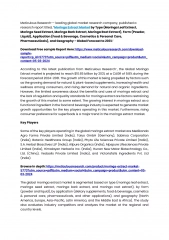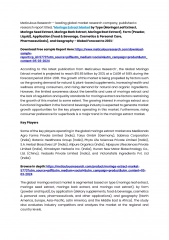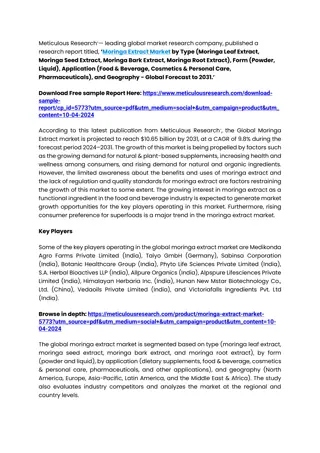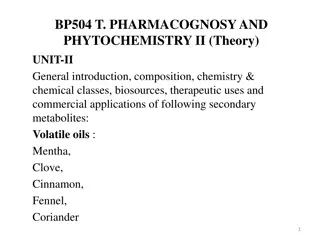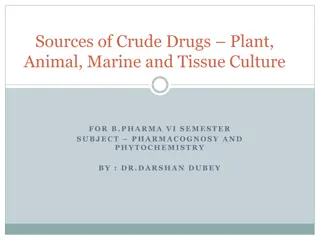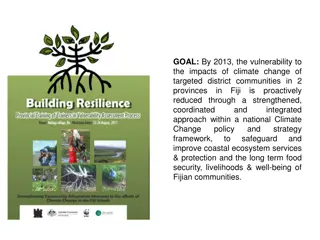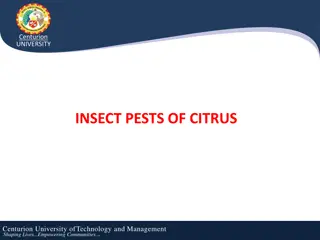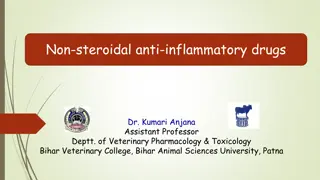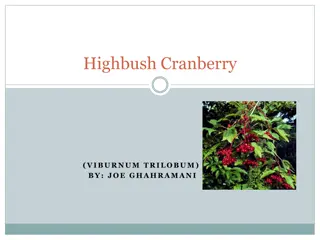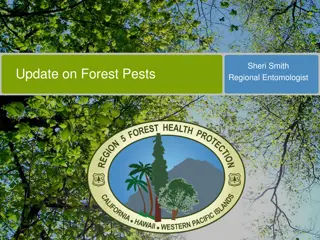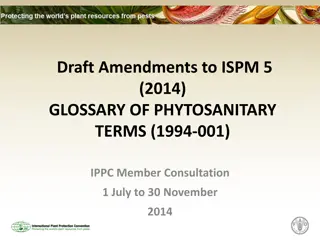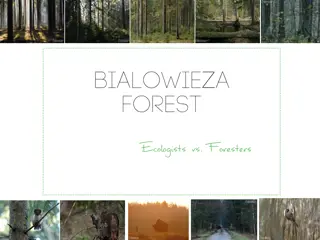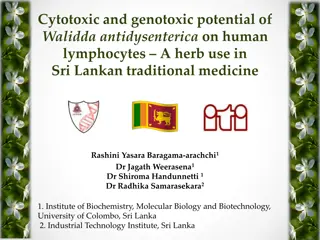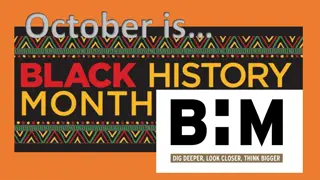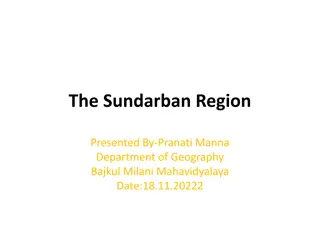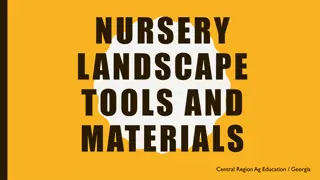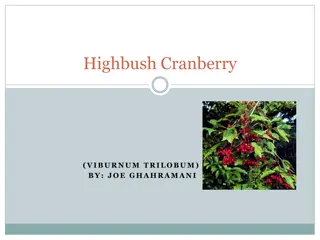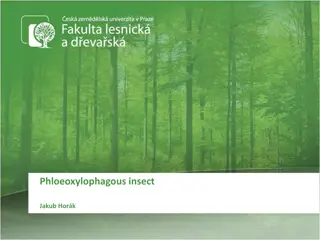moringa
Moringa Extract Market by Type (Moringa Leaf Extract, Moringa Seed Extract, Moringa Bark Extract, Moringa Root Extract), Form (Powder, Liquid), Application (Food & Beverage, Cosmetics & Personal Care, Pharmaceuticals), and Geography - Global Forecast to 2031\n
1 views • 3 slides
moringa
Moringa Extract Market by Type (Moringa Leaf Extract, Moringa Seed Extract, Moringa Bark Extract, Moringa Root Extract), Form (Powder, Liquid), Application (Food & Beverage, Cosmetics & Personal Care, Pharmaceuticals), and Geography - Global Forecast to 2031\n
0 views • 3 slides
Explore the World of Mangrove Forests in Bangladesh
Dive into the beauty and significance of mangrove forests showcased in Bangladesh, particularly focusing on the Sundarbans. Learn about the unique ecosystem, wildlife, and global importance of these saline forests. Discover the intriguing facts about mangroves and form your own opinions by expressin
2 views • 23 slides
moringa 2
Moringa Extract Market by Type (Moringa Leaf Extract, Moringa Seed Extract, Moringa Bark Extract, Moringa Root Extract), Form (Powder, Liquid), Application (Food & Beverage, Cosmetics & Personal Care, Pharmaceuticals), and Geography
0 views • 3 slides
The Pros and Cons of Different Types of Anti-Bark Collars
anti-bark collar for dogs\n\nbark collar training\u00a0\n\nFor more info, visit our site \/\/hiddenfence.com.au\/\n
8 views • 4 slides
Cultivation and Production of Cinnamon Oil from Cinnamomum zeylanicum
Cinnamon oil, derived from the dried inner bark of Cinnamomum zeylanicum trees, has various uses and applications. This article discusses the cultivation and production process of cinnamon oil, including propagation methods, harvesting techniques, and drying processes to obtain the final product. Wi
1 views • 22 slides
Creolit and Cultural Identity in the Francophone Caribbean
Exploring the concept of Creolit in the Francophone Caribbean through the works of Maryse Cond, this lecture delves into the unique perspective that emphasizes the use of Creole language as a foundation for literature. It discusses the tensions between authenticity and exclusion, as well as the them
2 views • 9 slides
Sources of Crude Drugs: Plant, Animal, Marine, and Tissue Culture in Pharmacognosy
Crude drugs are natural substances obtained from plants, animals, and minerals. They are used without much processing and have therapeutic properties. Different plant parts like leaves, flowers, fruits, seeds, roots, bark, and stems yield various important drugs. Animals and minerals also serve as s
1 views • 19 slides
Sources of Drugs and Their Origins
Drugs can be sourced from six major categories: plants, animals, minerals/earth, microbiological sources, semi-synthetic sources, synthetic sources, and recombinant DNA technology. Plant sources, being the oldest, provide various medicinal properties through leaves, flowers, fruits, seeds, roots, ba
0 views • 11 slides
Discover Exciting Citizen Science Projects on SciStarter
Explore a variety of engaging citizen science projects on SciStarter, where you can contribute to scientific research from monitoring bark beetles to studying urban birds. Join projects like Project FeederWatch, Foldit, and Stream Selfie to participate in meaningful scientific initiatives. Get invol
0 views • 7 slides
Enhancing Climate Resilience in Fiji Through Ecosystem Protection and Community Engagement
The project aims to reduce vulnerability to climate change impacts in targeted Fijian communities by strengthening coastal ecosystem services, protection, and food security. Key components include mangrove protection, community-based adaptation, and policy integration within national frameworks to e
0 views • 8 slides
Insect Pests of Citrus: Identification, Behavior, and Management
Insect pests such as citrus butterfly, fruit-sucking moth, leaf miner, rust mite, and bark-eating caterpillar pose significant threats to citrus plants. These pests can damage citrus seedlings and various fruit varieties. Understanding their appearance, distribution, life cycle, and management techn
4 views • 14 slides
Overview of Alkaloids in Pharmacology
Alkaloids are natural compounds found in various plants with diverse pharmacological properties. This lecture delves into alkaloids derived from sources like cinchona bark, discussing their structures, properties, and medical applications. It explores alkaloids such as quinine, quinidine, and ipecac
0 views • 17 slides
Overview of Non-Steroidal Anti-Inflammatory Drugs (NSAIDs) in Veterinary Pharmacology
Non-steroidal anti-inflammatory drugs (NSAIDs) are a diverse group of medications with analgesic, anti-inflammatory, and antipyretic effects. They act primarily on peripheral pain mechanisms and have limited CNS effects. NSAIDs have a long history dating back to the use of White Willow bark, and the
0 views • 16 slides
Comprehensive Guide to Cinnamon Oil: Cultivation, Properties, and Uses
Cinnamon oil, extracted from the bark of Cinnamomum trees, is a valuable ingredient known for its aromatic and medicinal properties. This guide covers the cultivation process, macroscopic characteristics, chemical constituents, and uses of cinnamon oil. From its geographical sources to chemical test
0 views • 8 slides
Exploring the Wonders of Cinnamon Bark and Its Uses
Cinnamon bark, derived from Cinnamomum zeylanicum trees, is a revered spice known for its aromatic qualities. The powder showcases light brown or yellowish-brown color with a sweet taste. Microscopically, it contains phloem fibers, sclereids, and parenchyma fragments. This versatile ingredient serve
2 views • 8 slides
Comprehensive Guide to Highbush Cranberry (Viburnum trilobum)
Highbush Cranberry, known scientifically as Viburnum trilobum, is a deciduous shrub that grows up to 12 feet tall. It features dark green leaves in summer and maroon foliage in fall, white flowers, and bright red or orange fruits that persist through winter. This plant thrives in moist and slightly
0 views • 7 slides
Update on Forest Pests Impacting Northern CA National Forests
Regional entomologist Sheri Smith provides insights on the devastating impact of forest pests on Northern CA National Forests, including tree mortality rates, drought conditions, bark beetle attacks, and the vulnerability of trees to various stress factors, with a highlight on the significant tree d
0 views • 29 slides
Proposed Amendments to ISPM 5 (2014) Glossary of Phytosanitary Terms
The draft amendments to ISPM 5 (2014) Glossary propose additions and revisions to terminology related to phytosanitary measures. Changes include defining bark as a commodity, adding a declaration for regulated articles, and distinguishing between grain and seeds as commodity classes. The updates aim
0 views • 8 slides
Białowieża Forest: Europe's Last Primeval Forest
Białowieża Forest, the largest natural forest complex in the Central European Lowlands, is a treasure trove of diverse forest communities and abundant wildlife. Protected since ancient times, it faces threats like the European spruce bark beetle. Ecologists advocate for forest conservation to pres
0 views • 13 slides
No Bark Collar User Manual Overview
This user manual provides important safety information and detailed instructions for using the no bark collar effectively. It covers key features, operational methods, product specifications, and care tips. The collar is designed to assist in training dogs to reduce excessive barking through vibrati
0 views • 9 slides
Cytotoxic and Genotoxic Potential of Walidda Antidysenterica on Human Lymphocytes: A Study in Sri Lankan Traditional Medicine
Investigating the cytotoxic and genotoxic effects of Walidda antidysenterica extracts on human lymphocytes in Sri Lankan traditional medicine. The plant is widely used for its diverse medicinal properties, including treating various diseases and promoting overall health. The study aims to understand
0 views • 27 slides
The Mangrove Nine: Struggle for Justice in Notting Hill
The Mangrove Nine were nine individuals arrested in 1970 for incitement to riot during a peaceful protest outside the Mangrove restaurant in Notting Hill, London. Despite facing initial charges and a controversial trial, the case marked a significant moment in the fight for Civil Rights in Britain a
0 views • 4 slides
Fun and Interesting Anecdotes: Students, Breakups, and Sports Facts
Perica tries to go home by being mischievous in class, a boy breaks up with a girl for having nothing in common, Josh and David face amusing mishaps while moving furniture, Sam learns the outside of a tree is called bark in a funny classroom moment, and interesting facts about Cristiano Ronaldo, han
0 views • 16 slides
Explore the Sundarbans: A Deltaic Region of Unique Beauty and Biodiversity
The Sundarbans, a deltaic region shaped by the Ganges, Brahmaputra, and Meghna rivers, offers a diverse landscape of mudflats, water channels, and mangrove forests. Learn about its physical characteristics, tropical climate with distinct monsoon seasons, and how the delta was formed through sediment
0 views • 27 slides
Essential Nursery Landscape Tools and Materials in Central Region Ag Education, Georgia
Explore a collection of vital tools and materials for nursery landscaping in the Central Region Agricultural Education of Georgia. From bark medium to irrigation timers, these items play crucial roles in maintaining and enhancing outdoor spaces. Discover the diverse range of resources essential for
0 views • 30 slides
Fijian Masi - Brown Dye Task with Mangrove Bark
Explore the traditional Fijian art of masi, involving brown dye made from mangrove bark to create intricate patterns. Solve the task of determining how many sections can be decorated with existing dye tubs. Visual representations included.
0 views • 6 slides
Guide to Growing and Using Highbush Cranberries
Highbush Cranberry, also known as Viburnum trilobum, is a versatile shrub with dark green leaves that turn maroon in fall. It thrives in moist, slightly acidic soils, producing bright red or orange fruit that persists through winter. This plant is native to Canada and requires cross-pollination for
0 views • 7 slides
Understanding Phloeoxylophagous Insects and Their Impact on Forests
Phloeoxylophagous insects, such as bark and ambrosia beetles, play a significant role in forestry as wood-boring organisms. This group primarily consists of beetles, hymenopterans, and flies, with beetles being the most prevalent. The last generation of Ips typographus, a bark beetle, undergoes a cr
0 views • 55 slides
